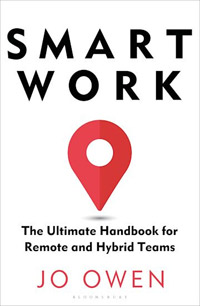 The world is still adjusting to the impact of the pandemic, and employees are still getting used to remote/hybrid work. Many team leaders and managers may still be poorly equipped to deal with it. The more casual ways of managing in a physical office simply don’t work with remote teams, and most tasks will be more challenging when conducted at a distance.
The world is still adjusting to the impact of the pandemic, and employees are still getting used to remote/hybrid work. Many team leaders and managers may still be poorly equipped to deal with it. The more casual ways of managing in a physical office simply don’t work with remote teams, and most tasks will be more challenging when conducted at a distance.
Aspects of this will be great news for some people: managing remote teams can often raise the bar for leaders and managers, as well as for the teams themselves. But office-based, face-to-face leadership, while certainly effective, is often more informal and ad hoc, and a number of basic management tasks can be much harder to complete remotely:
- Managing workloads and performance.
- Resolving problems and miscommunications.
- Motivation (and the lack of);
- Professional development and ongoing training; and
- Identifying, setting and measuring goals and targets.
Jo Owen, who has author 20 books on work and productivity, has an answer, in his latest book: Smart Work (published by Bloomsbury). The only four-time winning author of the Chartered Management Institute Gold Award, Owen appears regularly across national media and is a sought-after international keynote speaker.
Here is an excerpt from Smart Work, reproduced here with permission of the publishers.
Motivate yourself and your team
You only excel at what you enjoy because success requires sustained effort and extra effort. You have to step up for the special project where you learn new skills, you have to put in extra hours to help out in a crisis, you have to go the extra yard to turn a good presentation into a great presentation. Simply doing your job is not enough to progress. Success is built on endless discretionary effort. Your career is a marathon, not a sprint. To succeed, you need the will to put in extra hours not just for a few weeks, but for a few decades. You can only do that if you enjoy what you do.
In the short term, professionals can sustain extra effort to deal with a crisis. That is what has happened in the early stages of the pandemic. The response was a tribute to the commitment and motivation of all professionals. But when the second lockdown came, the motivation was no longer there. The excitement and novelty of dealing with the crisis had gone, and all that was left was the long grind of working in isolation and morale plummeted in many fi rms. Once the crisis is over, you need to find another way of sustaining the motivation of
your team.
While many people enjoyed WFH, many others suffered, especially if they were isolated, or had poor conditions for WFH. WFH and hybrid working forces managers to be more conscious and deliberate in how they motivate their team.
There are, broadly, two ways to motivate yourself and your team: extrinsic or intrinsic.
● Extrinsic motivation involves things like money and working conditions. They were the staple of trade union negotiations for decades. The negotiations normally led to unhappy workers, not happy workers. At the other extreme, money is clearly a motivator in some industries such as investment banking. The problem with the money motivator is the hedonic treadmill: the more you have, the more you want. You find that you have to run faster and faster just to keep up. There is always something more you want, especially as you will be surrounded by peers and bosses who already have something more than you. Stepping off the treadmill is hard: once you are used to the champagne and caviar lifestyle it is hard to go back to living on pies and pints of beer. And as for the horror of having to turn right at the aircraft door ...
● Intrinsic motivation lasts longer but is harder to build. Intrinsic motivation is about having a strong inner drive to do your job, regardless of extrinsic drivers such as pay and conditions. Organizations with some of the most committed staff have some of the poorest extrinsic motivators. The army, church and voluntary organizations are full of very committed people working on low pay and often in poor conditions.
This section is about how you can find intrinsic motivation for yourself. The goal is to wake up in the morning wanting to work, not having to work. The essence of intrinsic motivation comes down to another version of RAMP, which we can call mini-RAMP or motivation-RAMP.
● Relationships, which are supportive.
● Autonomy.
● Mastery.
● Purpose.
Think about the times you have felt most motivated and the chances are that they follow the RAMP principle. You will have had good relationships with your colleagues; you will have been trusted by your boss who gave you autonomy and freedom to get on with the job; you would have had the skills to perform the job and may have learned new skills as well; your work will have had meaning and purpose.
Motivation matters for your performance, and for the performance of those you lead. I asked a school class if they had ever been taught by an unhappy teacher. A forest of small arms shot up in the air. I asked them to describe what it was like. The broad summary: it was miserable. Everyone knows when the boss is unhappy and it is good for no one. You can only motivate your team if you are motivated yourself. As a motivated team leader, your task is to help your team discover their intrinsic motivation. You cannot tell them to be happy or motivated, but you can create the conditions in which they will flourish.
The RAMP model implies that we should start our journey with supportive relationships. However, this journey starts with Purpose. Motivation without purpose is very hard to achieve. Although we start with purpose, the model remains RAMP. Calling it the PRAM model really does not work at all.
